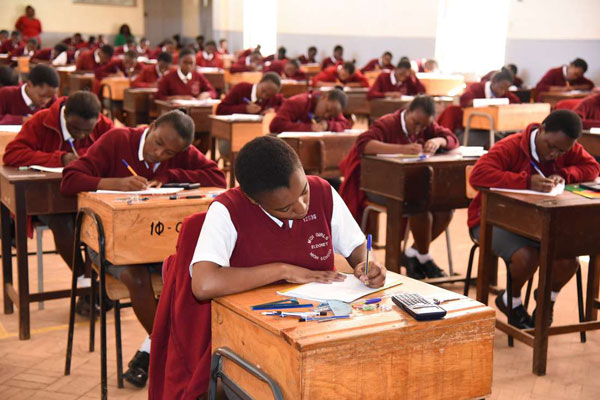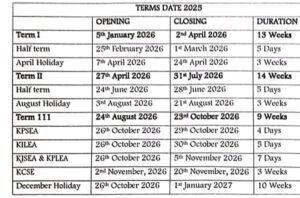Kenya intensified its crackdown on KCSE malpractice in 2025, dismantling new cheating networks and strengthening penalties under the KNEC Act. Here’s how the integrity war is reshaping national exams.
Kenya’s 2025 KCSE examination cycle has become a defining moment in the country’s ongoing battle against exam malpractice. While the number of irregularities dropped from 614 in 2024 to 418 this year, the Ministry of Education has revealed that the reduction reflects not only tighter oversight but also the exposure of new and more sophisticated cheating networks. Education Cabinet Secretary Julius Ogamba noted that although progress is notable, the fight is far from over.
Security agencies, examination officials, and KNEC investigators worked jointly this year to track emerging patterns of impersonation, digital leak attempts, and coordinated cheating rings operating across counties. Several arrests were made in connection with attempts to circulate alleged examination materials on encrypted online platforms. According to internal ministry reports, some groups employed proxy candidates and tried to infiltrate examination centres using forged identification documents.
Under the KNEC Act of 2012, penalties for these offences remain severe. Offenders risk deregistration of centres, nullification of entire school results, disqualification from future exams, or criminal prosecution. Impersonation, considered the most serious offense, now carries the added punishment of being barred from taking KCSE until 2027. This penalty is aimed at deterring candidates and cartels that recruit proxy exam takers each year.
To curb these networks, the Ministry of Education implemented several new reforms in the 2025 exam cycle. Examiners from compromised centres were barred from participating in the marking process. Over 32,558 examiners will work in 40 centres equipped with advanced security protocols, including digital access control and enhanced verification methods. These measures are meant to eliminate loopholes that have previously been exploited by dishonest actors.
The ministry’s heightened vigilance extended beyond the KCSE to include the Kenya Junior School Education Assessment (KJSEA). With results expected by December 11, the ministry hopes to finalise early placement into Senior School under the Competency-Based Education (CBE) pathways. Officials say this early release is part of broader reforms meant to ease administrative pressure and give families ample time for preparations.
CS Ogamba highlighted that the reduction in cheating cases demonstrates that while cartels remain active, their operations are becoming riskier and less sustainable. He also noted that the ministry has been monitoring unusual behaviour around exam distribution centres. Officers from the Ministry of Interior and the Ministry of Education worked together to enforce strict protocols, with centre managers reporting daily to exam containers for secure material retrieval.
As the transition to CBE continues, the KCSE is in its sunset years, expected to end fully by 2027. The government is working to ensure that even as the exam is phased out, the standards of integrity remain intact. The CS acknowledged that this year’s milestone — the final Physics Practical paper — symbolised Kenya’s commitment to safeguarding the value of national assessments.
Despite the improvements, challenges remain. Some schools still attempt to circumvent the system through coordinated collusion between teachers and candidates. The ministry also faces the persistent challenge of social media leaks, where individuals attempt to share fake or doctored materials to mislead candidates and parents.
The CS further revealed that special arrangements were made for hospitalised candidates who wished to sit their exams. However, he expressed condolences following the death of several learners during the exam period. He assured families that the government remains committed to supporting affected schools and communities.
Meanwhile, nationwide examination activities continue as the November Technical and Vocational Education and Training (TVET) exams proceed. More than 54,000 candidates across 752 institutions are sitting Business and Technical papers. The same security and integrity measures applied in KCSE are being enforced in TVET centres.
Ogamba ended by urging the public to remain vigilant even after the exam period. He encouraged anyone with information about malpractice to report it anonymously. The ministry has set up secure reporting channels to ensure confidentiality and swift investigation.
With cheating becoming increasingly sophisticated, Kenya’s fight for exam integrity remains dynamic. While 2025 marks a step forward, the ministry acknowledges that sustained reforms, technological upgrades, and collaboration across sectors will be essential to completely neutralise examination fraud in the years ahead.





